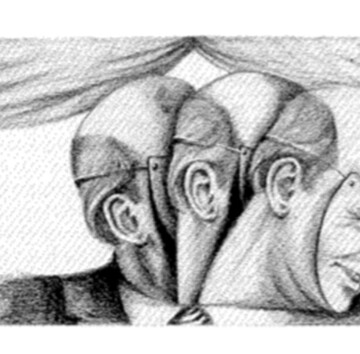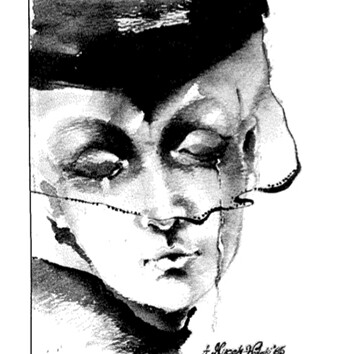Two or three times a week, after dinner, I watch the traffic jam outside Franco’s bar. What causes it nobody knows, but a perfectly ordinary intersection of two perfectly ordinary country roads is suddenly blocked. Nobody knows why the best watermelon is the one with the smallest spot on the bottom, or how come the...
Author: Andrei Navrozov (Andrei Navrozov)
Letter From the Argentario: Local Color
The promontory of Monte Argentario, billowing on the clothes line of the Tyrrhenian coast of Italy like an Hermes shirt held in place by three pins of land, is famous for its summer resort towns of Porto Ercole and Porto Santo Stefano. The shirt, which has been lost so suddenly by so many here in...
Waugh After Waugh
When, after a stint in the British Army which left him crippled for life, Auberon Waugh went up to Oxford in 1959, by his own admission he knew nothing of the place apart from what he had read in his father’s novel, Brideshead Revisited, describing the Oxford of 35 years earlier—and in Sinister Street, portraying...
The Skinny on the Pulps
In the days before my life became a perpetual holiday, there was always the pair of inquisitive Italians across the table who wanted to know why I had chosen to live in London. They saw I was a writer, and an unambitious one at that; why not live in Italy? They saw I liked eating;...
The Truth About Beauty
Apart from talking about cooking while eating and about eating while not eating, Italians have a favorite subject, a kind of pet peeve, which they touch upon at least a dozen times a day in that same disarmingly artless voice in which the English exchange news of the weather. It is a fact that the...
Supply and Demand
Well, from New York actually, with a stopover in London where we took on board and I was able to read again England’s four competing and mutually adversarial “serious” daily newspapers, not counting the specialized Financial Times: the Times, the Daily Telegraph, the Independent, and the Guardian. None of them is perfect, or perhaps even...
More Wine, Professor?
There may not be a word for “home” in French, philosophizes Twain in The Innocents Abroad, but “considering that they have the article itself in such an attractive aspect, they ought to manage to get along without the word.” Who has not seen semantic peculiarities insinuate themselves, with the facility of cognac taken on the...
Where All Belong
In my letter last month I tried to describe the noble seriousness of Italian life, unique in that it has given the modern world a middle class with a human face. Even on a simple physical level such as that of the naked eye or of the camera lens, one can observe this seriousness like...
Nothing Better to Do
I have always wanted to spend some time in Rome, for a whole rosary of personal reasons. As with much else in a person’s private life, to recount these in print is to expose oneself to public ridicule. Yes, Rome is a wonderful city. Yes, the food is good. But then in England, where I...
The Totalitarian Bug
One day last autumn a stray clipping reminded me that the first news from abroad that startled me in England—where, six years ago, I fled from the optimism of the New York Times as I had fled from the comparably totalitarian bonism of Pravda 12 years earlier— was not some distant rumbling of Kremlin intrigue...
The Formidable Evil
Reviewing a polemical pamphlet of mine on Sovietology published by the Claridge Press in London, Arnold Beichman assured readers of the May issue of Chronicles that I am “a serious man.” The bulk of his review, however, supported the proposition that I am a conspiracy nut, a proposition whose originality the reviewer may well have...
Totalitarianism With a Capitalist Face
In an essay dated January 1, 1991, and published last July, on the day Mikhail Gorbachev met John Major in London, I forecast the former’s demise. “Sadly for his Western admirers,” I wrote, “even unprecedented dictatorial powers cannot guarantee political longevity in Gorbachev’s case. He is a dictator by the grace of the secret-police apparatus:...
Jack and Jill, or Why I Am Not a Conservative
He who has seen the present has seen everything, said Marcus Aurelius, and this is why the floor of my study is made concave by the aggregate weight of all the newspapers and magazines I have acquired since moving to Cambridge: I simply cannot bring myself to throw away a single page of newsprint. In...
Prison Pencil, Supermarket Crayon
“Poets in our civilization,” a famous poet wrote in his most famous essay, “must be difficult.” He went on to explain his thought, and his Englishspeaking audience understood him. When the thought was translated, it went on living in other languages. But would an English-speaking audience understand his famous lines: Please come with me When...
The Banality of Fiction
It’s Sunday morning in London. The Sunday Times is here. (Yes, we too have a Sunday Times.) The “Week in Review” section is nice and fat. (Yes, it’s nice and fat here, too.) Headline: “End Game: Why the Soviets are pulling out of Afghanistan.” Photo of Najibullah, photo of Gorbachev, photo of two smiling soldiers....
The Other Pasternak
Sir Ernst Gombrich, for one, is glad to hear the news. The eminent art historian stands in the modestly furnished drawing room of his Hampstead house, leafing through his copy of Leonid Pasternak’s memoirs, recently published in England. The book’s publication had attracted the attention of the Smithsonian Institution, and the first retrospective of the...
April in Paris
The banging was first heard somewhere in the Alsace countryside, an hour or so after the train left Basel. For some reason, local worthies invariably pronounce the city’s name the French way, making it sound like the pagan deity denounced by the Hebrew prophets. The temples of Baal, in this unconscious interpretation, are the ubiquitous...
Viktor’s Spetsnaz, John’s Southwestern
Last September, some readers may recall, my letter was devoted to Viktor Suvorov, the pseudonymous writer and former GRU officer who now lives in England under yet another assumed name. It has taken me nearly a year to track down the author of Spetsnaz. Soon after our conversation begins, he recites in Russian: In ’41...
In Defense of Conspicuous Consumption
After my March letter, “Three Days in Sodom, Two in Gomorrah,” readers of this magazine have written to ask why I am so down on conspicuous consumption. I want to go on record here: I am not. But even a gourmand should disapprove of gluttony, since pleasure exists only insofar as it is subject to...
Causley at 70
My formal association with Chronicles began in February 1986, when, at the suggestion of its editor, I wrote an obituary of Philip Larkin. Looking back at the history of my loves, I explained that I had decided to buy and edit The Yale Literary Magazine because “my ambition in life was to find the poet...
Order and Justice? Cowardice and Folly!
In April 1986, Nikolai Tolstoy’s The Minister and the Massacres was published in Britain. Like his earlier Victims of Yalta (1978) and Stalin’s Secret War (1981), the book was uncompromising in its indictment of Prime Minister Harold Macmillan personally and of British foreign policy generally at the end of the war. “In the second week...
The Writer as a Young Liar
Recently, someone asked me to review Selected Letters of Fyodor Dostoyevsky, but so far nothing has come of it. The book, published by Rutgers University Press, is the fruit of many years’ work under the direction of Joseph Frank, author of the voluminous Dostoyevsky biography. It contains a selection of 152 letters, culled from the...
Three Days in Sodom, Two in Gomorrah
“Party for a book? I’d love to,” I mutter to my host as we land in Sodom. Five days of vacation lie before me, and as we drive to the place—”Where the old McAlpin used to be, downtown,” the limousine driver reminisces—it is pleasant to think that people here still publish books. After a ride...
Whose War Is It, Anyway?
According to Josef Joffe, foreign editor of the Süddeutsche Zeitung, the German historian Ernst Nolle once asked at a Harvard seminar whether anyone present could find the idea of the “Final Solution” in history before Hitler. Since no one answered, he drew the attention of his audience to the work of Marx and the concept...
Anatomy of a Swindle
I never thought I would be a sucker for royalty, but there is now a good reason to admire Prince Charles. He hates Richard Rogers. In August, the British press reported on the dismay of the nation’s “architectural profession, flinching at the prospects of another outburst along the lines of ‘monstrous carbuncle’ (the Prince’s dismissal...
The Craft of Art
If in political and social terms the diminishing role of the aristocracy in Europe was, in the historian’s view, inevitable, in cultural terms its dissipation was not really felt until the turn of the century. Indeed, the intellectual history of our time is a record of careless exploitation and ruthless expropriation of what had once...
A Technical Point
The event known as the accident at Chernobyl will be remembered by history for the scarcity of contemporary information about it in the world at large, a degree of ignorance far more remarkable than the event itself. The event, after all, was diagnosed as an accident, which made it interesting to the antinuclear left; was...
An Episode in Chianti
Still sealed in the gray velvet envelope of night, early morning in the Florentine countryside offers the June insomniac stray, loud cars, merciless crickets, and doomsday frogs. These supplant the earlier nightingales, thrashing a capella, as if lured by the glowworms whose light illuminates an equally desperate vanity. By daybreak, a storm begins; not the...
Spetsnaz
This month I am reporting from London on the recent publication here of what is undoubtedly one of the most important books ever written on the subject of totalitarian expansionism. I offer this judgment because, although the accident of birth and intellectual curiosity have made Soviet Russia a subject of special interest for me, I...
How I Expanded My Mind
A few weeks ago I went to Munich to see a dentist. The meaning of that experience had not dawned on me in all its vastness until recently. The very word “travel” is repugnant to me. I have never used it to describe my movements, since I always feel I am going somewhere for a...
The Oxford Experience
The recent election of the new Chancellor of Oxford University—or was it the prospect of another July undisturbed by fireworks?—reminded me of the letter I received from a Cambridge friend last summer, when I was living in Oxford. I quote it with minor deletions. “Warm greetings to the Latin Quarter of Morris-Cowley, and happy Fourth...
Will It Play in Peoria?
Chronicles readers may remember that in my last letter I described the “Russian Style” exhibition in London as a Soviet propaganda ballon d’essai, flown to test Western media response to the new nationalism emanating from Moscow. It is by no means coincidental that such a test should be made here rather than in the United...
The Art of Regicide H.R.H.
The Duchess of York wore a blue and black top, with a navy-blue belt, over a black, knee-length leather skirt. The female figure which stood before her was wearing a ball gown consisting of a bodice and skirt of pale eau-de-nil panne velvet decorated with vertical stripes of sequins and lace inserts embroidered with jewels;...
Is Old Bob McNamara Still Teaching at Harvard?
I had the distinct feeling I had seen the book somewhere before. It was almost like the old cinematographic cliche: close-up of the Treblinka torturer’s face in a dream sequence, a faded photograph shot in sepia tones, men running through the courtyard. The title was respectable enough, The Faber Book of Contemporary American Poetry, Faber...
The Genius of Redundance
“Simplicity,” the Russian proverb tells us, “is worse than theft.” Meaning, economy is just another name for sterility. This is an easy thing to believe as I write this in the middle of London, the Old World piling up stone all around me in a paean to the unnecessary. But what is necessary? As Tolstoy...
Temporizing on the Thames
It is one of the chief distinguishing features of the philistine that he thinks himself, above all things, “openminded.” While the converse of this proposition is untrue, modern culture having witnessed an explosion in the doctrinaire varieties of philistinism, it is nevertheless a fact that the trueblue, classic philistine, of the kind described by the...
Triptych of a Tartar
“The terrible thing, my dear, is not that they call Schnabel the Michelangelo of our time. They call everybody the Michelangelo of our time. The terrible thing is that Michelangelo was really the Schnabel of his time, and I’m the only one who will tell you so.” The speaker, red-bearded and blue-eyed, is so slight...
Best-Sellers & Brown-Baggers
It is tempting to say that Mary Bringle’s Hacks at Lunch was written by a hack—at lunch or otherwise engaged. But so laconic a pronouncement would leave the reviewer open to charges of disingenuousness and flippancy; and, since some such judgment cannot be substantively avoided, it must be elucidated and qualified. The premise of this...
Samizdat Philistine
The philistine is alive and well in Soviet Russia—and, like his brethren the world over, he is writing novels. It is a mistake to assume that under the conditions of totalitarianism, culture naturally separates, like oil and vinegar, into two discrete layers: the official, government layer and the subterranean, clandestine one. Instead, rather like the...
Bianca and the Commissar
I was reading at the Periodicals Room of Yale’s Sterling Memorial Library the other day. The magazine I happened to pick up was called Soviet Literature, subtitled “A Monthly Journal of the Writers’ Union of the U.S.S.R. published in English, French, German, Spanish, Hungarian, Polish, Czech, and Slovak.” The issue, for March 1985, “marked the...


